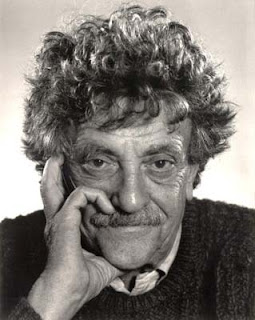Hocus Pocus by Kurt Vonnegut
Originally published in 1990.
Hocus Pocus starts out at the end and you spend the whole book reading little stories to see how the character ended up where he is now.
Eugene Debs Hartke is a prisoner being held in the library of Tarkington College. The book is his collected memoirs which were written on numbered pieces of scrap paper. The future he lives in is dominated by the Japanese economy and the American foreign and domestic policies are consumed by "The War on Drugs." Racism is much more prevalent.
Eugene Debs Hartke was a teacher at Tarkington College, a college for very rich Special Education students who would not graduate from a traditional university. Across the lake is a maximum security prison that holds 10,000 prisoners - most of them were Special Education students who turned to crime to make a living.
This is a good book, but it starts out a little slow. There are similar themes as other Vonnegut books I've read, especially his focus on how life's little choices can radically change what happens to you.
Vonnegut is a master at coming up with quotable odd thoughts and here are a few that caught my eye:
"In an era as foulmouthed as this one, (someone saying) 'Good gravy' had the same power to startle as a cannon shot."
On human space travel:
"How could all that meat, needing so much food and water and oxygen, and with bowel movements so enormous, expect to survive a trip of any distance whatsoever through the limitless void of outer space? It was a miracle that such ravenous and cumbersome giants could make a round trip for a 6-pack to the nearest grocery store."
"Another flaw in the human character is that everybody wants to build and nobody wants to do maintenance."
On Freedom of Speech:
"That isn't something that someone else gives you. That's something you have to give yourself."
Anyway, its a good book. I enjoyed it. It made you think sometimes and that is always good.
Reviewed in 2004.
This book can be found on Amazon.com here: Hocus Pocus .
.
5 stars out of 5.
Hocus Pocus starts out at the end and you spend the whole book reading little stories to see how the character ended up where he is now.
Eugene Debs Hartke is a prisoner being held in the library of Tarkington College. The book is his collected memoirs which were written on numbered pieces of scrap paper. The future he lives in is dominated by the Japanese economy and the American foreign and domestic policies are consumed by "The War on Drugs." Racism is much more prevalent.
Eugene Debs Hartke was a teacher at Tarkington College, a college for very rich Special Education students who would not graduate from a traditional university. Across the lake is a maximum security prison that holds 10,000 prisoners - most of them were Special Education students who turned to crime to make a living.
This is a good book, but it starts out a little slow. There are similar themes as other Vonnegut books I've read, especially his focus on how life's little choices can radically change what happens to you.
Vonnegut is a master at coming up with quotable odd thoughts and here are a few that caught my eye:
 |
| Kurt Vonnegut (1922-2007) |
On human space travel:
"How could all that meat, needing so much food and water and oxygen, and with bowel movements so enormous, expect to survive a trip of any distance whatsoever through the limitless void of outer space? It was a miracle that such ravenous and cumbersome giants could make a round trip for a 6-pack to the nearest grocery store."
"Another flaw in the human character is that everybody wants to build and nobody wants to do maintenance."
On Freedom of Speech:
"That isn't something that someone else gives you. That's something you have to give yourself."
Anyway, its a good book. I enjoyed it. It made you think sometimes and that is always good.
Reviewed in 2004.
This book can be found on Amazon.com here: Hocus Pocus
5 stars out of 5.











Comments
Post a Comment